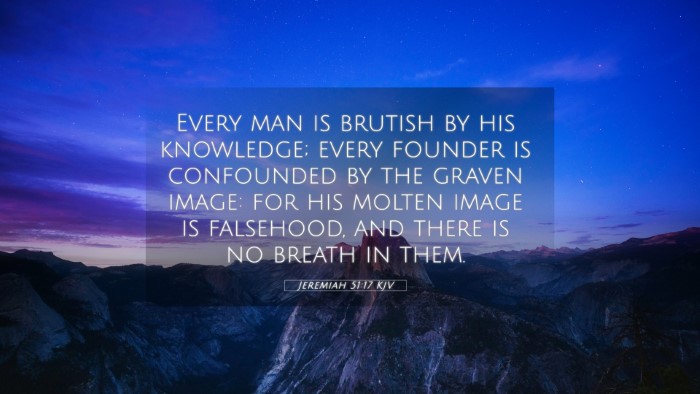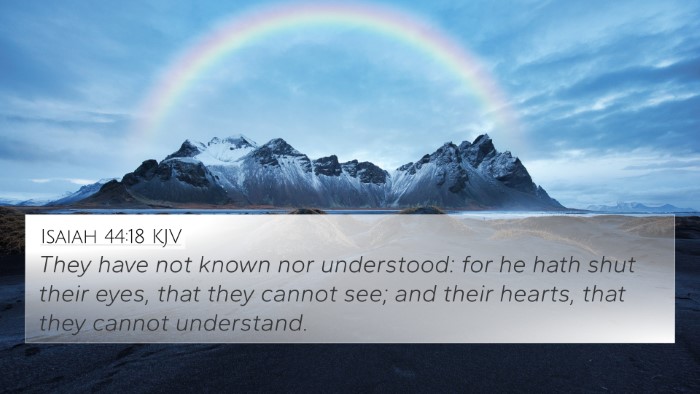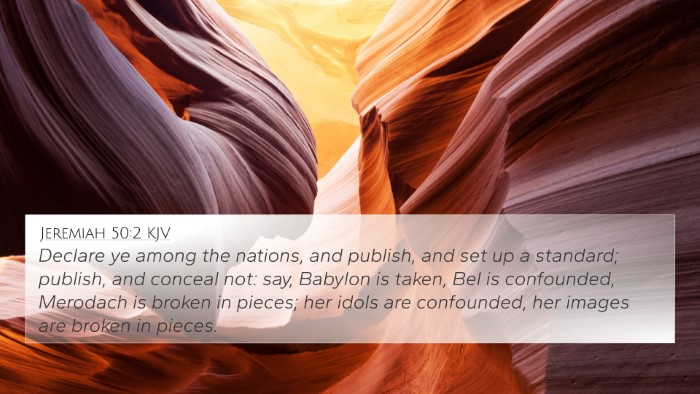Understanding Jeremiah 51:17
Jeremiah 51:17 states: "Every man is brutish in his knowledge; every founder is confounded by the graven image: for his molten image is falsehood, and there is no breath in them." This verse cautions against the folly of idolatry and the misguided trust in human wisdom and craftsmanship. Below, we analyze its meaning, significance, and connections with other Biblical texts.
Verse Meaning and Interpretation
This verse highlights a few key themes:
- Human Ignorance: The term "brutish" suggests a level of ignorance and lack of understanding among people when it comes to divine truths. Matthew Henry notes that it signifies moral stupidity in failing to recognize the true God.
- Idolatry's Fallacy: The "graven image" and "molten image" symbolize false gods. Albert Barnes explains that the artisans who create idols are confounded because these images lack life and power.
- The True Nature of God: This verse contrasts the idolatrous images with the living God who breathes life and spirit into His creation, whereas idols are mere lifeless objects. Adam Clarke emphasizes that true knowledge comes from recognizing and worshipping the true God rather than created things.
Connections Between Bible Verses
Jeremiah 51:17 connects with several verses throughout scripture, reinforcing the themes of idolatry, human folly, and divine wisdom. Below are some key cross-references:
- Isaiah 44:9-20: This passage discusses the absurdity of idol-making and the blindness of those who depend on such false gods.
- Psalm 115:4-8: This psalm highlights the impotence of idols, stating that those who make them become like them.
- 1 Corinthians 8:4-6: Paul emphasizes that idols are nothing in the world and that there is only one God, which parallels the warning in Jeremiah.
- Romans 1:21-23: This section discusses the futility of human wisdom when it strays from acknowledging God.
- Exodus 20:4-5: These verses from the Ten Commandments prohibit the making of graven images, reinforcing the message of Jeremiah.
- Habakkuk 2:18-19: This passage critiques the futility of idol worship and the spiritual ignorance it represents.
- Acts 17:29: Paul addresses the idol worshippers in Athens, pointing out their misconceptions about God and leading them to the truth of His nature.
Comparative Bible Verse Analysis
In comparing Jeremiah 51:17 with other relevant scriptures, we see a consistent theme of the futility of idolatry:
- Exodus 20:4-5 vs. Jeremiah 51:17: Both emphasize God's command against worshipping images and the consequences of such practices.
- Psalm 135:15-18 vs. Jeremiah 51:17: This psalm describes the lifelessness of idols, echoing the warnings found in Jeremiah.
- Colossians 2:8 vs. Jeremiah 51:17: Paul warns against philosophy and empty deceit that does not align with Christ, similar to the criticism of human wisdom in Jeremiah.
Thematic Bible Verse Connections
This analysis opens a broader understanding of recurring Biblical themes:
- Idolatry: Across both the Old and New Testaments, idolatry is presented as a major sin that leads to spiritual blindness.
- Divine Knowledge vs. Human Foolishness: The message warns that wisdom rooted in human understanding is inadequate compared to divine truth.
Implications for Personal Study
For those engaging in personal study, the themes within Jeremiah 51:17 encourage examination of one’s own beliefs and practices. Here are some tools for Bible cross-referencing:
- Use a Bible concordance to identify related verses efficiently.
- Explore a Bible cross-reference guide to deepen understanding of interrelated passages.
- Get familiar with cross-reference Bible study methods that help in thematic connections.
- Utilize Bible reference resources for comprehensive studies on specific topics.
Conclusion
In summary, Jeremiah 51:17 serves as a powerful reminder of the void in idolatry and human wisdom without God. It invites believers to seek the living God and emphasizes the importance of true knowledge rooted in the Scriptures. In studying this verse, we can find rich connections throughout the Bible that strengthen our understanding of faith, wisdom, and the dangers of spiritual ignorance.














